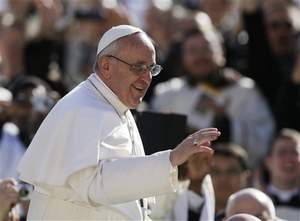Pope Francis’ Warning to Europe Lost on Lesbian Politician
 Pope Francis starkly warned European leaders last month they have lost trust by enacting policies that are “insensitive” and “harmful,” giving Europe the image of a “grandmother, no longer fertile” and breeding “certain rather selfish lifestyles.” They must guard against misusing the concept of human rights, he stated.
Pope Francis starkly warned European leaders last month they have lost trust by enacting policies that are “insensitive” and “harmful,” giving Europe the image of a “grandmother, no longer fertile” and breeding “certain rather selfish lifestyles.” They must guard against misusing the concept of human rights, he stated.
One European Parliamentarian called it “a timely wake-up call.” Another said his “wisdom reached out to everyone.” But Ulrike Lunacek – author of a homosexual rights resolution that generated massive opposition by citizens – handed the Pope a rainbow scarf as he walked by. “It would be great if you had spoken up in favor of same-sex marriage or also for the use of contraceptives,” she told him.
“But I didn’t hear that and that was a bit disappointing,” she said.
Pope Francis’ address to the European Parliament covered a range of ills – including brutality against Christians, discarding human lives deemed useless, and the isolation of “lonely” people – along with a prescription for recovery.
Protect human dignity, he advised. The family, with a mother and father to nurture children, is the “most precious element of any society” and gives “direction and hope to new generations.”
Lunacek is co-president of the European Parliament Intergroup on LGBT Rights.
Early this year, she introduced a “Roadmap for LGBTI Rights” directing European Union countries to adopt comprehensive policies giving preferential attention to lesbian, gay, bisexual, transgender and intersex rights.
It insists countries recognize homosexual unions registered elsewhere, and gender changes, despite their own laws. Fertility services to create children must be provided to LGBT persons, and family law adapted to allow more than two parents. Sex education can only convey a positive view of LGBTI persons.
Her report urges countries register and investigate undefined “hate crimes” against homosexuals and transgender persons – which can include feeling discriminated against – and criminalize “incitement to hatred on grounds of sexual orientation and gender identity.” Acts incited and committed against people for supporting traditional morality and marriage are not covered.
“All the rights and policies referred to already exist under EU law, for everyone,” Lunacek stated. Her report, however, institutes a hierarchy, with vigorous enforcement for LGBT people. When LGBT policies conflict with people’s rights – such as parents who object to teaching mature sexual information to children – LGBT demands will prevail.
European Parliament members reportedly received over 100,000 complaints urging them to reject Lunacek’s report. Despite widespread opposition, it passed handily.
In his address, Pope Francis let the politicians know Europe’s reputation is damaged.
Europe is “less and less a protagonist in a world which frequently regards it with aloofness, mistrust and even, at times, suspicion.” Their institutions are “engaged in laying down rules” which are seen “as insensitive to the concerns of individual people, if not actually harmful.”
The “great ideas which once inspired Europe” have been “replaced by the bureaucratic technicalities of its institutions.”
Many members in the European Parliament welcomed Pope Francis’ message.
Gianni Pittella praised the “tough and severe messages aimed at waking up Europe to its original and most important mission: putting human dignity and fundamental rights at the center of its actions.”
As for the Pope, he described his speech as “a message of hope in the Lord, who turns evil into good and death into life.”

